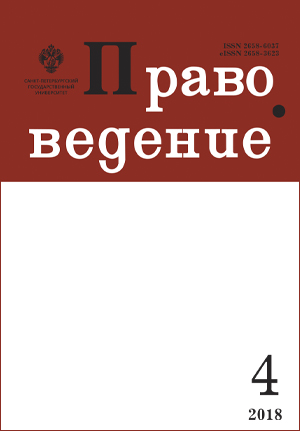Compensation mechanism as a condition of commercial use of environmental components
DOI:
https://doi.org/10.21638/spbu25.2018.405Abstract
The mechanism of compensation by the entrepreneur for the harm caused to the environment is part of the public-law regime for the use of nature by entrepreneurs; it consists in carrying out preventive and remedial measures, according to the draft economic activity. Through state environmental assessment and environmental impact assessment, the state assesses the adequacy of these measures to reduce the negative impact on the environment, the admissibility of the implementation of this economic activity, taking into account their implementation. As a result, for an entrepreneur, the limits of activity are established, which is an element of the private-legal regime for economic activity by entrepreneurs. If the entrepreneur complies with the established limits, carrying out activities in accordance with the project of economic activities approved during the state environmental impact assessment, he cannot be forced to compensate the damages in order of the tort liability, including under the current version of article 1064 of the Civil Code. In the legal relationship of obligation, entrepreneurs are liable for responsibility, being responsible for violation of an obligation without fault, but in tort obligations, increased responsibility of entrepreneurs is not established. The increased civil liability of the entrepreneur for the harm lawfully caused to the environment could be established, given that, when starting to carry out economic activities related to the impact on the environment, entrepreneurs assume the risk of adverse consequences in the form of a negative change in the state of the environment, which is not due to the shortcomings of the entrepreneur ‘s behavior (a commercial risk). However, the entrepreneur can only be held liable in three cases. First, for harm exceeding the limits of the agreed project of economic activity, second, for failure to carry out preventive and reconstruction measures or for unfair performance thereof and third, for activities carried out without passing the state ecological expertise. Damage exceeding the established limits can be compensated by insurance compensation under the environmental insurance contract. However, within the framework of such a model of relations between the entrepreneur and the State, the environmental user should be guaranteed that he will not be held liable for damage caused to the environment lawfully, as well as that his liability for damage exceeding the limits is limited to the maximum amount of insurance compensation.
Keywords:
compensation of harm, legal regime, economic activity, environmental management of entrepreneurs, ecological insurance, tort liability
Downloads
References
Downloads
Published
How to Cite
Issue
Section
License
Articles of "Pravovedenie" are open access distributed under the terms of the License Agreement with Saint Petersburg State University, which permits to the authors unrestricted distribution and self-archiving free of charge.




